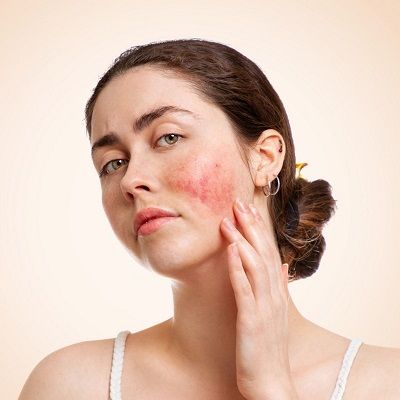Rosacea is commonly associated with redness and flare-ups on the face, but can it affect the scalp? While the condition primarily manifests on the cheeks, nose, and forehead, certain individuals may experience symptoms on their scalp as well. When this happens, it often leads to discomfort, itching, and sensitivity. People with a history of rosacea or highly sensitive skin are more prone to these scalp-related symptoms. If left unmanaged, the condition can cause irritation, dryness, and even a burning sensation on the scalp. Seeking Rosacea Treatment in Dubai can help individuals manage their symptoms effectively through advanced dermatological solutions.
How Rosacea Manifests on the Scalp
While less common than facial rosacea, scalp rosacea can present in unique ways. Some of the key signs include:
- Redness and Inflammation – The scalp may appear flushed or red, particularly along the hairline.
- Sensitivity to Hair Products – Individuals with scalp rosacea may find that shampoos, conditioners, or styling products cause irritation.
- Burning or Stinging Sensation – Affected individuals often describe an uncomfortable warmth or tingling sensation on the scalp.
- Flakiness and Dryness – Unlike dandruff, the flakiness caused by rosacea tends to come with redness and irritation.
- Itching and Discomfort – Persistent itching can be a major concern, leading to discomfort throughout the day.
Triggers That Worsen Scalp Rosacea
Like facial rosacea, the scalp version is influenced by specific triggers. Understanding these can help in managing flare-ups. Some common triggers include:
- Sun Exposure – UV rays can cause an inflammatory response, worsening symptoms.
- Heat and Humidity – Extreme temperatures often exacerbate scalp sensitivity.
- Alcohol-Based Hair Products – Styling products with alcohol can strip moisture and lead to irritation.
- Spicy Foods and Hot Beverages – Diet can influence rosacea symptoms, including those on the scalp.
- Stress and Anxiety – Emotional stress is a known contributor to flare-ups.
Effective Treatments for Scalp Rosacea
Managing scalp rosacea requires a specialized approach, as traditional hair care routines may not be suitable for sensitive skin. Here are some effective treatments:
Gentle Medicated Shampoos
Using shampoos with anti-inflammatory ingredients can help reduce redness and irritation. Look for sulfate-free options that cater to sensitive skin.
Prescription Topical Treatments
Dermatologists often recommend creams or gels containing metronidazole, azelaic acid, or ivermectin to reduce inflammation. These should be applied with care to avoid excess dryness.
Oral Medications
For persistent cases, oral antibiotics or low-dose isotretinoin may be prescribed to control flare-ups from within.
Laser and Light Therapies
Advanced treatments such as laser therapy can effectively minimize redness and inflammation by targeting blood vessels under the skin. This method is gaining popularity in Dubai's dermatology clinics due to its precision and long-term results.
Scalp-Friendly Moisturizers
Lightweight, non-comedogenic moisturizers can help maintain hydration and reduce irritation without clogging the scalp’s pores.
FAQ's
1. Can rosacea lead to hair loss?
While rosacea itself doesn’t cause hair loss, excessive itching and inflammation can lead to breakage or shedding if left unmanaged.
2. Is scalp rosacea contagious?
No, rosacea is not contagious. It is a chronic skin condition influenced by genetics and environmental factors.
3. Can I use regular anti-dandruff shampoos for scalp rosacea?
Not all anti-dandruff shampoos are suitable. Some contain harsh ingredients that may worsen irritation. Always opt for dermatologist-recommended formulas.
4. Does diet impact scalp rosacea?
Yes, certain foods—especially spicy dishes, alcohol, and caffeine—can trigger flare-ups. Maintaining a balanced diet can help reduce symptoms.
5. Can I still color my hair if I have scalp rosacea?
It depends on the severity of your condition. Some hair dyes contain irritants that may cause a reaction. Consult a dermatologist before proceeding with any chemical treatments.
Conclusion
Rosacea can indeed affect the scalp, leading to redness, itching, and sensitivity. While it may not be as widely recognized as facial rosacea, the discomfort it causes can significantly impact daily life. Identifying triggers, using dermatologist-approved products, and exploring professional Rosacea Treatment can help individuals manage symptoms effectively. With the right approach, it’s possible to keep scalp rosacea under control and maintain a healthy, irritation-free scalp.






Comments